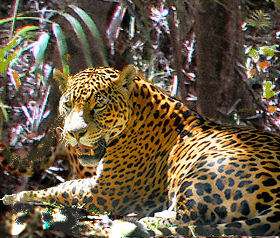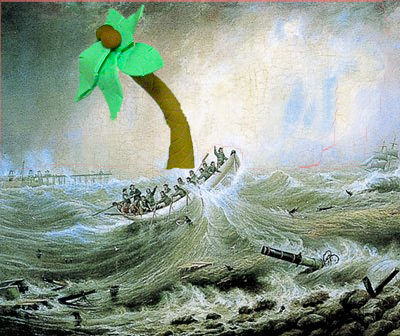 [image from Sheila Newman & wikipedia] ScienceDaily (Feb. 2, 2009) — "The Wildlife Conservation Society (WCS) has released photos from the first large-scale census of jaguars in the Amazon region of Ecuador—one of the most biologically rich regions on the planet.
[image from Sheila Newman & wikipedia] ScienceDaily (Feb. 2, 2009) — "The Wildlife Conservation Society (WCS) has released photos from the first large-scale census of jaguars in the Amazon region of Ecuador—one of the most biologically rich regions on the planet.
The ongoing census, which began in 2007, is working to establish baseline population numbers as oil exploration and subsequent development puts growing pressure on wildlife in Ecuador's Yasuni National Park and adjacent Waorani Ethnic Reserve. Together, these two protected areas make up some 6,500 square miles (16,800 square kilometers) of wilderness."
Mother Nature recognised at law
In September 2008 Ecuador became the first country in the world to declare constitutional rights to nature, thus codifying a new system of environmental protection. Original Article source.
Reflecting the beliefs and traditions of the indigenous peoples of Ecuador, the constitution declares that nature “has the right to exist, persist, maintain and regenerate its vital cycles, structure, functions and its processes in evolution.” This right, the constitution states, “is independent of the obligation on natural and juridical persons or the State to indemnify the people that depend on the natural systems.”
Nature not just an object for economic appropriation

The new constitution redefines people’s relationship with nature by asserting that nature is not just an object to be appropriated and exploited by people, but is rather a rights-bearing entity that should be treated with parity under the law.
Mari Margil, Associate Director of the Environmental Legal Defense Fund, worked closely over the past year with members of Ecuador’s constitutional assembly on drafting legally enforceable Rights of Nature, which mark a watershed in the trajectory of environmental law.
Ecuador’s leadership on this issue may have a global domino effect. Margil says that her organization is busy fielding calls from interested countries, such as Nepal, which is currently writing its first constitution.
Flawed by failure to mandate indigenous community consultation
For all of the hope and tangible progress the Rights of Nature articles in Ecuador’s constitution represent, however, there are shortcomings and contradictions with the laws and the political reality on the ground. A fundamental flaw in the constitution also exists due to Correa’s refusal to include a clause mandating free, prior, and informed consent by communities for development project that would affect their local ecosystems.
“I expect them [the multinational extractive industries] to fight it,” says Margil. “Their bread and butter is based on being able to treat countries and ecosystems like cheap hotels. Multinational corporations are dependent on ravaging the planet in order to increase their bottom line.”
Mining treats countries and ecosystems like cheap hotels
 Investigation of Texaco [Caltex in Australia] oil-exploration in the Amazon.
Investigation of Texaco [Caltex in Australia] oil-exploration in the Amazon.
The new Mining Law, introduced by Ecuador’s own President Rafael Correa and backed by Canadian companies, which hold the majority of mining concessions in Ecuador, is a testament to Margil’s forecast. The Mining Law would allow for large-scale, open pit metal mining in pristine Andean highlands and Amazon rainforest. Major nationwide demonstrations are being held in protest, with groups accusing Correa of inviting social and environmental disaster by selling out to mining interests.
Carlos Zorrilla, executive director of Defensa y Conservación Ecológica de Intag, who has been a tireless defender of the environment against transnational mining companies, says that while the new constitution looks good on paper, “in practice governments like Correa’s will argue that funding his political project, which will bring ‘well being and relieve poverty,’ overrules the rights of nature.”

Yet even as Ecuadoran President Correa embraces the extractive economic model of development, the inclusion of the rights of nature in a national constitution sets inspiring and revolutionary precedent. If history is any indicator, Ecuadorians will successfully fight for the Rights of Nature, with or without their president.
U.S. Media: Update by Cyril Mychalejko
When Ecuadorians drafted and passed a new constitution, which gave nature inalienable rights, the US media largely ignored this historic development. In the case of the Los Angeles Times, one of the few mainstream outlets to cover the story, the newspaper’s editorial board trivialized the development (“Putting Nature in Ecuador’s Constitution,” September 2, 2008) by suggesting it sounded “like a stunt by the San Francisco City Council” and that it seemed “crazy.”
“As ecological systems around the world collapse, we need to fundamentally change our relationship with nature. This requires changes in both law and culture, and ultimately our behavior as part of nature,” said Mari Margil, Associate Director of the Defense Fund, who is disappointed in how the US media largely ignored the story.
In Ecuador, at the time of the constitutional vote, the optimism over how the “Rights of Nature” clauses would translate into policy was guarded.
“As exciting as these developments are, it was also inevitable that the people in power would, and will, find ways to circumvent, undermine, and ignore those rights,” said Carlos Zorrilla, executive director of Defensa y Conservación Ecológica de Intag.
Multi-national mining companies dangerously influence national laws
According to Zorrilla, a major disappointment has been President Rafael Correa’s new mining law.
“The law takes rights-to-nature loopholes and widens them so that giant dirt movers could easily drive through them,” said Zorrilla, who has been working with communities of Ecuador’s Intag region to resist mining and promote sustainable development. “To mention a couple of examples, the law does not prohibit large-scale mining in habitats harboring endangered species, nor the dumping of heavy metals in rivers and streams.”
See also, "Ecuador Rising"..
"Ecuador Rising"..
Indigenous leaders file law-suit
Indigenous leaders responded by filing a lawsuit before Ecuador’s Constitutional Court in March 2009, seeking to overturn the mining law, which they believe is unconstitutional. Article 1 of the “Rights of Nature” clauses states: “Every person, people, community or nationality, will be able to demand the recognitions of rights for nature before the public organisms. The application and interpretation of these rights will follow the related principles established in the Constitution.”
Regardless of the ongoing struggles to ensure that the true meaning and scope of the constitution is upheld, Dr. Mario Melo, a lawyer specializing in Environmental Law and Human Rights and an advisor to Fundación Pachamama-Ecuador, believes that the nature clauses which reflect the traditions of indigenous peoples could offer a path to an ecologically sustainable future.
Rights to nature = progress
“I consider that the recognition of the ‘Rights to Nature’ as a progress on a global scale and one that deserves to be globally broadcast and commented on as a contribution from Ecuador towards the search of new ways of facing the environmental crisis due to climate change.”
The struggles of Ecuadorian social movements and the Ecuadorian government to uphold the “Rights of Nature” and to create a new development model that places human beings as interdependent parts of nature, rather than dominant exploiters of nature, is something we should continue to monitor and learn from.
Source:
Upside Down World, September 25, 2008
Title: “Ecuador’s Constitution Gives Rights to Nature”
Author: Cyril Mychalejko
and
Project Censored
Student Researcher: Chelsea Davis
Faculty Evaluator: Elaine Wellin, PhD
Sonoma State University
 Crew aboard a ship at a BHP terminal in Queensland claim they are being starved and underpaid, in yet another instance of the coal giant’s veil of secrecy over its operations in Australian waters. A seafarer aboard an 80,000-tonne bulk carrier, the Villa Deste, contacted the International Transport Workers’ Federation (ITF) pleading for help (email below). The starving crew claims to have no food and no onboard wages, and being fed on a $4 food budget per day.
Crew aboard a ship at a BHP terminal in Queensland claim they are being starved and underpaid, in yet another instance of the coal giant’s veil of secrecy over its operations in Australian waters. A seafarer aboard an 80,000-tonne bulk carrier, the Villa Deste, contacted the International Transport Workers’ Federation (ITF) pleading for help (email below). The starving crew claims to have no food and no onboard wages, and being fed on a $4 food budget per day.
 The last Australian seafarers to carry iron ore for BHP and BlueScope — work that was undertaken for more than a century — will return home tomorrow after completing their final voyage to Dandong, China. “Scott Morrison should front up to Sydney Airport, meet these workers, and tell them why his government has rubber-stamped BHP and BlueScope replacing them with exploited foreign seafarers who are paid as little as $2 an hour.” (MUA Secretary.)
The last Australian seafarers to carry iron ore for BHP and BlueScope — work that was undertaken for more than a century — will return home tomorrow after completing their final voyage to Dandong, China. “Scott Morrison should front up to Sydney Airport, meet these workers, and tell them why his government has rubber-stamped BHP and BlueScope replacing them with exploited foreign seafarers who are paid as little as $2 an hour.” (MUA Secretary.) As the first anniversary of Haiti's devastating earthquake approaches, the questions that I asked then (below) remain unasked and unanswered by the Canadian media today. Apparently, as Garrett Hardin famously observed, no one ever dies from over-population. And no one ever dies from Canada's criminally irresponsible foreign aid and immigration policies, which are serving as birth stimulants to those nations--- like Haiti---which are given little incentive to address the root cause of their misery.
As the first anniversary of Haiti's devastating earthquake approaches, the questions that I asked then (below) remain unasked and unanswered by the Canadian media today. Apparently, as Garrett Hardin famously observed, no one ever dies from over-population. And no one ever dies from Canada's criminally irresponsible foreign aid and immigration policies, which are serving as birth stimulants to those nations--- like Haiti---which are given little incentive to address the root cause of their misery.
 [image from Sheila Newman & wikipedia] ScienceDaily (Feb. 2, 2009) — "The Wildlife Conservation Society (WCS) has released photos from the first large-scale census of jaguars in the Amazon region of Ecuador—one of the most biologically rich regions on the planet.
[image from Sheila Newman & wikipedia] ScienceDaily (Feb. 2, 2009) — "The Wildlife Conservation Society (WCS) has released photos from the first large-scale census of jaguars in the Amazon region of Ecuador—one of the most biologically rich regions on the planet.
 Investigation of Texaco [Caltex in Australia] oil-exploration in the Amazon.
Investigation of Texaco [Caltex in Australia] oil-exploration in the Amazon.
Recent comments